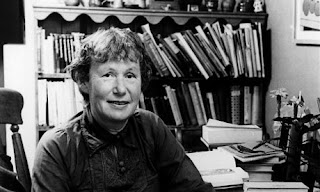For today, I'll offer another quick dip into Penelope Fitzgerald's volume of letters, So I Have Thought of You. To her friend Hugh Lee, Fitzgerald, not quite twenty-four, wrote on November 13, 1940,
I hear Oxford is violently gay and in general suggests those bits in comedy films where you see champagne glasses superimposed on merry-go-rounds to suggest dissipation, so when I come up I do hope you will be able to show me some of it.That image of drunken debauchery returned to my mind this morning when I was flipping through Jerry White's London in the Eighteenth Century: A Great and Monstrous Thing and got to the section on drinking. In a paragraph rich with interpolated quotations that make for my favorite type of history writing, White writes,
Drink played a large part in the culture of every rank in eighteenth-century London. James Boswell's drinking bouts, for instance, faithfully but shamefacedly recorded in his diaries, might make a slim volume on their own. At the chaplain's table at St James's Palace in December 1793, "that exquisite wine" champagne confined to France by the wartime blockade, the company had to make do with "madeira, sherry, hock, port, and claret, and good malt liquor; and I took enough to warm me rather too much." "Madeira, sherry port, old hock circulated" at a private dinner given by a vintner two or three months later, "and we had a glass both of burgundy and champagne. And lastly came an elegant dessert and Scotch pints of very capital claret"--a Scotch pint some three times larger than the English variety: "The generous bottle circulated so as to produce in my a total oblivion till I found myself safe in my own bed next morning. "Even his twelve-year-old son Jamie, at Westminster School, was forced by the scholars "to drink burgundy until he was intoxicated." When John Yeoman, a Somerset dairy farmer and potter, spent a night in London on a visit in 1774, "we made to free with the Duce of the Vine. Mr. Forrester Was quite full, went home to his house Where he was so Sick that it flew out att both ends like a Bedlamite."Some points:
1. Yes, please, to the one-volume edition of Boswell's indulgences and hangovers!
2. A Scotch pint is more than 48 ounces? Good god, no wonder Dorothy Dunnett's Niccolo and Crawford of Lymond were such champion drinkers.
3. I did not know that among the stereotypical characteristics of inhabitants of Bedlam was dual evacuation. Ew.
Crossing the ocean, White quotes Ben Franklin, "a water drinker," who tells of his fellows at the printing house in which he worked as a young man:
We had an alehouse boy who attended always in the house to supply the workmen. My companion at the press drank every day a pint before breakfast, a pint at breakfast with his bread and cheese, a pint between breakfast and dinner, a pint at dinner, a pint in the afternoon about six o'clock, and another when he had done his day's work.As someone who usually regrets a second martini and always regrets--and thus nearly always avoids--a third, I am consistently astonished by the quantities put back by drinkers past. And it's not only the far distant--read the Johns O'Hara or Cheever, or Dashiell Hammett and attend to the drinking, and it's hard not to become queasy. To bastardize L. P. Hartley: the soaks of the past, they were another country.
I'll close with another line I happened to read today, from Karl Ove Knausgaard's autobiographical novel My Struggle:
[W]e went out almost every night, and on one of the nights, I can remember [my older brother] Yngve was surprised but also proud that I could drink five bottles of wine and still more or less behave.I'm guessing that "more or less" is doing quite a bit of work there. And it's important, for a full visual picture of the drunken teen, to know that this was Norway in 1985 or so and the prevailing style was punk-influenced new wave. Oh, and the novel is largely about how Knausgaard's father drank himself to death and how Knausgaard coped with that. As everyone from the Gin Lane reformers to the WCTU would tell you, there are consequences.

